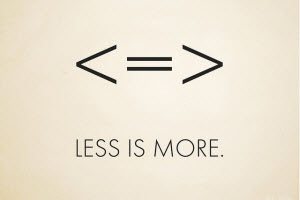
In The Markets :Less = More. Less positions, risk, decisions, hours at the screen and opinions of others = More Money


A successful trader:
Habitude 1: Preparedness

I was so inexperienced that I didn’t have the fear – the fear that cripples people who have been in the business too long. I have seen that so many times. Very few people maintain their ability to take risk throughout their career. Most don’t Most can’t. They have had too many bad things happen to them, too many fat tails, and it damages people – Steve Clark
What Clark is talking about here sounds like the opposite of beginner’s luck. I have seen a number of examples of this in the business world. People who work their whole lives to build something by taking risks suddenly don’t want to take risks anymore. They realize at some point that they now have things that they are no longer willing to lose. They have too much experience watching others fail.
It was a terrible shock to me ego. I began to doubt my ability. It was a very depressing time. It lasted for several months. I’ve seen this happen to many traders, and I have gone through it sever times myself. When you find that you can’t make any money, smaller and smaller losses take on greater and greater emotional significance, and you lose all perspective. – Steve Clark
2.) Remain flexible – When you don’t know what’s going to happen, the best strategy is to be ready for anything.
3.) Take reasoned risks – reasonable exposure and positive edges only.
A Reasoned risk is more like an educated guess rather than a roll of the dice. A Reasoned risk limits exposure so that one or a few trades will not affect the trader’s account too adversely should the trades turn out badly. Great traders aren’t gamblers.
4.) Prepare to be wrong
5.) Actively seek reality
6.) Respond quickly to change – When a trader determined a place to get out of the trade, a competent trader will respond quickly and get out, thereby reducing his exposure to continued uncertainty to zero.
7.) Focus on decisions, not outcomes.
Fear is the emotion of survival.
Before every game or before the first trade of the day there is always that little bit of uncertainty. That feeling in your stomach. For me it always went away as soon as the first hit or the dink of my first order getting filled. Same is true with my fear of public speaking.
It was not always that way. I had to do the work, be prepared, and convince myself whatever the outcome I would work to achieve a better outcome the next time. Eventually the fear of not doing became worse than the fear of doing.
Like I always say, do it once, the good habits that is. (more…)